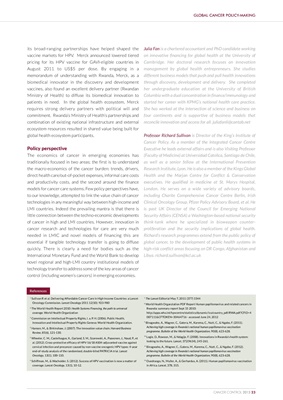
GLOBAL CANCER POLICY-MAKING
its broad-ranging partnerships have helped shaped the Julia Fan is a chartered accountant and PhD candidate working
vaccine markets for HPV. Merck announced lowered tiered on innovative financing for global health at the University of
pricing for its HPV vaccine for GAVI-eligible countries in Cambridge. Her doctoral research focuses on innovation
August 2011 to US$5 per dose. By engaging in a management by global health entrepreneurs. She studies
memorandum of understanding with Rwanda, Merck, as a different business models that push and pull health innovations
biomedical innovator in the discovery and development through discovery, development and delivery. She completed
vaccines, also found an excellent delivery partner (Rwandan her undergraduate education at the University of British
Ministry of Health) to diffuse its biomedical innovation to Columbia with a dual concentration in finance/immunology and
patients in need. In the global health ecosystem, Merck started her career with KPMG’s national health care practice.
requires strong delivery partners with political will and She has worked at the intersection of science and business on
commitment. Rwanda’s Ministry of Health’s partnerships and four continents and is supportive of business models that
combination of existing national infrastructure and external reconcile innovation and access for all. juliafanli@cantab.net
ecosystem resources resulted in shared value being built for
global health ecosystem participants. Professor Richard Sullivan is Director of the King’s Institute of
Cancer Policy. As a member of the Integrated Cancer Centre
Policy perspective Executive he leads external affairs and is also Visiting Professor
The economics of cancer in emerging economies has (Faculty of Medicine) at Universidad Catolica, Santiago de Chile,
traditionally focused in two areas; the first is to understand as well as a senior fellow at the International Prevention
the macro-economics of the cancer burden: trends, drivers, Research Institute, Lyon. He is also a member of the Kings Global
direct health care/out-of-pocket expenses, informal care costs Health and the Marjan Centre for Conflict & Conservation
and productivity costs, and the second around the finance executives. He qualified in medicine at St. Marys Hospital,
models for cancer care systems. Few policy perspectives have, London. He serves on a wide variety of advisory boards,
to our knowledge, attempted to link the value chain of cancer including Charite Comprehensive Cancer Centre Berlin, Irish
technologies in any meaningful way between high-income and Clinical Oncology Group, Pfizer Policy Advisory Board, et al. He
LMI countries. Indeed the prevailing mantra is that there is is past UK Director of the Council for Emerging National
little connection between the techno-economic developments Security Affairs (CENSA) a Washington-based national security
of cancer in high and LMI countries. However, innovation in think-tank where he specialized in bioweapon counter-
cancer research and technologies for care are very much proliferation and the security implications of global health.
needed in LMIC and novel models of financing this are Richard’s research programmes extend from the public policy of
essential if tangible technology transfer is going to diffuse global cancer, to the development of public health systems in
quickly. There is clearly a need for bodies such as the high-risk conflict areas focusing on DR Congo, Afghanistan and
International Monetary Fund and the World Bank to develop Libya. richard.sullivan@kcl.ac.uk
novel regional and high-LMI country institutional models of
technology transfer to address some of the key areas of cancer
control (including women’s cancers) in emerging economies.
References
1. 7.
Sullivan R et al. Delivering Affordable Cancer Care in High Income Countries: a Lancet The Lancet Editorial May 7, 2011 (377) 1544
Oncology Commission. Lancet Oncology 2011 12(10): 923-980 8.
World Health Organziation PDF Report Human papillomavirus and related cancers in
2.
The World Health Report 2010: Health Systems Financing, the path to universal Rwanda: summary report Sept 15 2010:
coverage. World Health Organization http://apps.who.int/hpvcentre/statistics/dynamic/ico/country_pdf/RWA.pdf?CFID=4
3.
Commission on Intellectual Property Rights, I. a. P. H. (2006). Public Health, 087111&CFTOKEN=30464716 - accessed June 24, 2012
9.
Innovation and Intellectual Property Rights Geneva: World Health Organization. Binagwaho, A., Wagner, C., Gatera, M., Karema, C., Nutt, C., & Ngabo, F. (2011).
4.
Hansen, M., & Birkinshaw, J. (2007). The innovation value chain. Harvard Business Achieving high coverage in Rwanda's national human papillomavirus vaccination
Review, 85(6), 121-130. programme. Bulletin of the World Health Organization, 90(8), 623-628.
10.
5.
Wheeler, C. M., Castellsague, X., Garland, S. M., Szarewski, A., Paavonen, J., Naud, P., et Logie, D., Rowson, M., & Ndagije, F. (2008). Innovations in Rwanda's health system:
al. (2012). Cross-protective efficacy of HPV-16/18 AS04-adjuvanted vaccine against looking to the future. Lancet, 372(9634), 245-261.
11.
cervical infection and precancer caused by non-vaccine oncogenic HPV types: 4-year Binagwaho, A., Wagner, C., Gatera, M., Karema, C., Nutt, C., & Ngabo, F. (2012).
end-of-study analysis of the randomised, double-blind PATRICIA trial. Lancet Achieving high coverage in Rwanda's national human papillomavirus vaccination
Oncology, 13(1), 100-110. programme. Bulletin of the World Health Organization, 90(8), 623-628.
6. 12.
Schiffman, M., & Wacholder, S. (2012). Success of HPV vaccination is now a matter of Ouedraogo, N., Muller, A., & Gerhardus, A. (2011). Human papillomavirus vaccination
coverage. Lancet Oncology, 13(1), 10-12. in Africa. Lancet, 378, 315.
CANCER CONTROL 2013 23